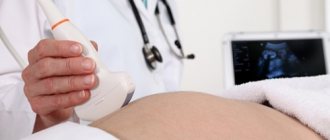How often can pregnant women undergo ultrasound examination?
Experts say that at the moment there is no
specific or general contraindications to the use of ultrasound. The same cannot be said about x-rays. The fact is that sound waves are not able to accumulate in the human body, and therefore affect its functional characteristics. That is why the frequency of this procedure will depend on the individual characteristics of each person. However, when performing an ultrasound, the doctor should always pay attention to the general health of the person.
How does ultrasound work?
When conducting such a study, ultrasonic waves penetrate our body, and since the tissues of the human body have varying acoustic resistance, they absorb or reflect them. As a result, different environments appear lighter or darker on the ultrasound machine screen.
To study each organ, its own wave parameters are used, for example, the thyroid gland is examined at a frequency of 7.5 MHz, and to diagnose the condition of the abdominal organs, 2.5 - 3.5 MHz is needed. It all depends on the characteristics of the tissues present in a certain location.
During an ultrasound examination, mild heating of tissue occurs, however, it is carried out in such a short time that it does not have time to affect the condition of the body and is not felt by the patient.
Is it possible to do an ultrasound during pregnancy?
At the moment, there is no information that proves the negative impact of ultrasound on the fetus and the mother’s body. However, doctors recommend limiting the use of ultrasound during pregnancy, so they advise you to undergo it only 1-3 times during the entire period of pregnancy
. Exceptions can only be made in cases in which ultrasound is necessary.
Ultrasound examination is not a mandatory examination during pregnancy. The doctor, first of all, is obliged to measure the abdomen and check the baby’s heartbeat. Everything else is at his discretion. You can always make an appointment with a gynecologist on our website or by phone.
Up ▲ — Reader reviews (2) — Write a review ▼ — Print version
November 18, 2021, 20:33:12[/td]
| Yuri | |
| city: Kursk | |
Okay, then let the respected ultrasound doctor explain how to undergo ultrasound diagnostics at a lower cost. After all, even when undergoing the so-called “Medical examination”, they do not prescribe diagnostics. You have to pay for everything in different centers. They found out that I had a heart attack on my legs, and I waited for 2 whole months to undergo a heart ultrasound under the POLICY for free. But what about that? writing is disgusting. It’s one thing on paper, another thing in life.
| Vladimir | 19 November 2021, 16:44:11 |
| city: Kursk | |
Why then is ultrasound excluded from clinical examination from 2021? To save money?
How often should an ultrasound be done?
If a person does not have any disturbances in the functioning of the body, then an ultrasound examination is rarely necessary, and only for preventive purposes. This procedure is carried out for the purpose of:
- Identifying the location of pain, swelling or infection;
- Diagnosis of heart diseases;
- Determining the presence of tumor diseases in children;
- Detection of tumors;
- Definition of diseases of the circulatory system.
Experts say that the optimal number of ultrasound procedures is only twice a year.
. Monthly diagnostics simply make no sense. If disturbances in the functioning of the body are detected, doctors themselves will prescribe this examination.
It is necessary to undergo regular examinations not only in old age, but also in young age. Such actions will help cope with serious disorders in the initial stages of their development. To stay healthy, you should exercise, practice good hygiene, and eat right.
Version for the visually impaired
Previous news Allergies. Myths and reality. Let's figure it out together
Next news The most common allergens
Grodno Regional Children's Clinical Hospital
Details Published March 19, 2020
Features of ultrasound in children
When working with children, it is necessary to take into account their psychological characteristics: children are very afraid of any medical procedures. Therefore, a child’s calm, neutral attitude towards research can be counted on only from 6-7 years of age. Even at this age, children are practically unable to accurately follow your orders like “lie on your side and hold your breath.”
Ultrasound for children should be performed in the presence of the child's mother or close relatives. It is better if the mother hugs the child during the examination. If a breastfed baby is being examined, an ultrasound may be performed while breastfeeding or bottle feeding.
The ultrasound room should be equipped with a sufficient number of bright toys made of polymer materials that can keep the child occupied,
The child’s body, especially at an early age, is exposed minimally, this helps prevent hypothermia and creates a feeling of protection in the child. It is imperative to remove the child’s shoes, even if he does not walk: when excited and resisting examination, small children “throw” their legs high and with hard shoes can injure themselves and those around them.
When examining a newborn, he is not completely undressed: only parts of the body directly at the site where the sensor is placed are exposed.
Conducting an ultrasound scan for adolescents has its own characteristics. Teenagers are often embarrassed by the doctor, especially girls, and it is better for them to have an ultrasound scan in the presence of their mother if you are examining the mammary glands or pelvis. Boys, on the contrary, usually do not want their parents to be present during the study, and it is advisable to fulfill the teenager’s desire. You should not allow parents, especially the mother, to be present during an ultrasound scan of a teenager’s scrotum - the mother’s extra emotions are not at all necessary for an already embarrassed child. You can give information to parents immediately after the examination is completed.
Children 3-5 years old who are afraid of the examination, but, in principle, are ready to listen to the doctor, should be shown the sensor, let them touch it so that the child is convinced that “there are no needles there,” let them touch the gel. This will take a minimum of time, and the inspection will be much calmer.
Young children 1-2 years old are often restless during ultrasound, it is almost impossible to persuade them, and to facilitate the examination, the child should simply be fixed on the couch (it is advisable to have two assistants - both arms and legs need to be fixed).
Considering that the doctor will need to communicate with the parents of young patients and answer their questions regarding the ultrasound method, I offer accessible answers to the most common questions from parents:
“Does the ultrasound hurt?” - “Not at all. Ultrasound radiation is not felt by human skin. You only feel the touch of the sensor on the body and the coolness from the gel, which is applied to the skin so that there is no air gap between the sensor and it.”
“Is ultrasound harmful?” - “No. Absolutely harmless. An ultrasound doctor works without protective equipment, unlike a radiologist.”
“At what age can children have an ultrasound scan?” - “From anyone, there are no restrictions. Ultrasound screenings of newborns and premature babies without any restrictions on the weight and height of the child.”
“How many times and with what frequency can an ultrasound be done?” — “The number of ultrasounds and their frequency are not limited. If necessary, ultrasound can be performed multiple times throughout the day.”
“Is it possible to do an ultrasound and other studies on the same day?” “Of course, ultrasound does not affect the child’s body and will not distort the results of other studies. You just need to adhere to a strict rule: first ultrasound, then painful or unpleasant procedures.”
“What complaints can you go for an ultrasound?” - “Almost anyone. An ultrasound allows you to see many internal organs, but the child often cannot determine exactly what and where it hurts. Children often complain of abdominal pain in the navel area, but in fact it could be appendicitis, gastritis, cholelithiasis, kidney disease or gynecological problems. Therefore, you need to look at the entire abdomen, and not limit yourself to just one zone.”
If an infant is restless, sleeps poorly, or regurgitates, you need to look not only at the stomach, but also at the head, since neurological problems in an infant can manifest themselves in the form of regurgitation and refusal to eat.
“And if the child is healthy, is it necessary to do an ultrasound?” - "Certainly. Let's consider several situations: your baby has just been born, and during pregnancy everything was fine on ultrasound, the birth went well, early development is also going well. In such a situation, it is advisable to conduct an ultrasound of the baby at the age of 1-1.5 months: neurosonography, abdominal organs, kidneys, pelvis, hip joints. Your baby is several months old, nothing bothers him, to rule out hidden diseases, an ultrasound should be performed, since as the child ages, some studies will become impossible, while others will be less informative. It is advisable to conduct neurosonography, ultrasound of the abdominal cavity, kidneys, and hip joints. The child is several years old, has not been ill with anything special, feels well, and is developing according to his age. It is necessary to do an ultrasound of the abdominal organs, kidneys, and pelvic organs, to make sure that the child does not have an anomaly in the structure of the internal organs, which may not manifest themselves in any way.
Be sure to examine your child if you are going to send him to the sports section. For certain anomalies in the structure of internal organs, participation in certain sports is not recommended.
If your child has already been examined using an ultrasound and nothing wrong was found, then there is no need to examine him more often than once a year for preventive purposes. If the baby has any complaints, then the examination will not be preventive, but diagnostic, but everything will be decided by your attending physician.
It is advisable to perform an ultrasound on your child before he starts going to kindergarten or school. In the latter case, for preventive purposes, in addition to ultrasound of the abdominal organs and kidneys, an ultrasound of the thyroid gland should be performed.
In adolescence, it is worth examining, in addition to the above areas, the internal genitalia of girls.
It is advisable to examine the heart using ultrasound screening at the age of about one year.
Doctor of the Ultrasound Department of the City Clinical Hospital T.V. Sofischenko
How often is an ultrasound done during pregnancy?
Ultrasound is one of the main diagnostic methods in obstetrics. It is very informative, and most importantly, it is safe for both the mother and the developing fetus. Ultrasound during pregnancy can be done many times, without risks to the health of the unborn child.
Make an appointment
How many times is an ultrasound done during a natural pregnancy?
According to the order of the Ministry of Health of the Russian Federation dated November 1, 2012, ultrasound is a screening (mass) examination for pregnant women, and is carried out three times during pregnancy as planned:
- in the first trimester - at 11-14 weeks;
- in the second trimester - at 18-21 weeks;
- in the third trimester - at 30-34 weeks.
First ultrasound
done to determine possible developmental defects in the fetus. In combination with other research methods (1st trimester screening), ultrasound diagnostics makes it possible to assess the individual risk of chromosomal abnormalities.
Second ultrasound
done to exclude late-manifesting (manifesting) congenital anomalies in the unborn child.
Third ultrasound
is carried out to determine the possible pathology of pregnancy and select the optimal method of delivery.
Additional ultrasounds during pregnancy
Sometimes the examination is not limited to three ultrasounds. Additional studies are carried out as indicated.
In the first trimester, at the very beginning of pregnancy, at 4-5 weeks, a diagnosis may be prescribed if an ectopic pregnancy is suspected. An ultrasound will help confirm or exclude this pathology.
In the second trimester, a woman may be prescribed Doppler ultrasound to assess the fetoplacental complex.
The patient may be referred for an additional ultrasound if a pregnancy pathology is detected - to assess its course over time and determine the effectiveness of the therapy. An ultrasound may also be prescribed immediately before birth.
How many times is ultrasound performed during pregnancy after IVF?
In the case of IVF, an additional ultrasound is performed 3 weeks after embryo transfer to confirm the fact of pregnancy.
A week before this, the level of hCG in the blood is determined. An ultrasound can not only detect the fertilized egg in the uterus, but also determine the fetal heartbeat.
Thus, after IVF, a woman undergoes an ultrasound scan at least 4 times. The first time is to confirm pregnancy. Then screening ultrasound is performed 3 more times in each trimester.
How many times can an ultrasound be done?
Ultrasound can be done as many times as the clinical situation requires. There are no restrictions on quantity.
Some expectant mothers are diagnosed only 3 times, as part of a screening examination. Others, in the case of pregnancy pathology, have to do up to a dozen ultrasound examinations during pregnancy, but this does not negatively affect the condition of the child.
Indications for additional examinations may include:
- suspicion of frozen pregnancy;
- bleeding in the first trimester;
- high risk of genetic pathologies (hereditary diseases in parents, family ties of spouses, age after 35 years);
- Rhesus conflict;
- multiple pregnancy;
- breech presentation of the fetus, detected at the third screening ultrasound;
- infectious diseases in the mother during pregnancy.
An unscheduled ultrasound with Doppler may be prescribed if fetal hypoxia is suspected, severe somatic diseases in the mother, or if the fetus has intrauterine growth retardation.
Don't worry if your doctor prescribes ultrasounds for you too often. If the doctor requires an extraordinary ultrasound diagnosis, it means there are reasons for this. Ultrasound is a harmless procedure, so you should not refuse it.











